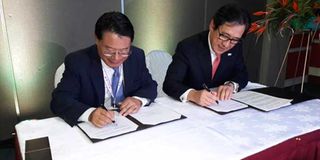African countries urged to exploit sustainable resources to eradicate poverty

Unido Director-General Li Yong (left) and Jetro CEO Hivoyoki Ishige sign an MoU during Ticad VI in Nairobi recently. Mr Yong said the agency will work closely with Jetro in supporting the needs of developing countries. PHOTO | RACHEL KIBUI | NATION MEDIA GROUP
What you need to know:
- During the event, Unido and Jetro signed a memorandum of understanding, which sealed a partnership between the two parties.
- AU Trade Commissioner Farima Haram called for a structural transformation of Africa’s economies through enhanced productivity.
- KAM CEO Phyllis Wakiaga called for the addressing of challenges facing the sector, regionally and internationally.
- She called for support and promotion of products produced by SMEs.
African countries are rich in resources that must be well exploited in order to create employment, boost industrialisation and eradicate poverty.
However, this will only be realised if there is sustainable infrastructure and mobilisation of sustainable resources, according to United Nations Industrial Development Organisation (Unido).
Unido Director-General Le Yong said the agency will work closely with the Japan External Trade Organisation (Jetro) in supporting the needs of developing countries.
Mr Yong was speaking at a side event during the recently concluded Ticad meeting in Nairobi.
During the event, Unido and Jetro signed a memorandum of understanding, which sealed a partnership between the two parties.
The partnership is aimed at developing and implementing joint cooperation projects and activities aimed at enhancing sustainable industrialisation in developing countries by promoting trade and investment.
This was the first MoU between Jetro and a UN agency, though the former has been working with Unido in other activities aimed at promoting economic growth.
Among top dignitaries who graced the event was Kenya’s Trade, Industry and Cooperate Principal Secretary (PS) Julius Korir, who represented President Uhuru Kenyatta.
PROMOTE VALUE ADDITION
Speaking on behalf of the Head of State, Mr Korir called for good governance and promotion of value addition as a way to boost trade and industrialisation in Africa.
“The real factors [standing] between us and industrialising Africa include basic micro-economic fundamentals like exchange rates and inflation,” said Mr Korir.
“Africa also needs to improve her resilience of financial system, create jobs and support economic diversification,” he added.
He hailed Kenya’s Vision 2030, calling it as a blueprint for transforming the country into a fully industrialised state.
The event, whose theme was "Enhancing Transformation Agenda Through Inclusive and Sustainable Industrial Development", was also attended by the Africa Union’s Commissioner for Trade and Industry Fatima Haram.
Like other dignitaries, Ms Haram called for a structural transformation of Africa’s economies through enhanced productivity and greater diversification of production and exports.

AU Trade Commissioner Fatima Haram (left) and other dignitaries during Ticad IV in Nairobi. Ms Haram called for a structural transformation of Africa’s economies through enhanced productivity. PHOTO | RACHEL KIBUI | NATION MEDIA GROUP
DEVELOP A COMMODITIES STRATEGY
“One of the priority projects under Africa Union’s Agenda 2063 is the development of [a] commodities’ strategy for the continent,” said an enthusiastic Haram.
The strategy, she added, lays out a vision for commodity-led industrialisation by using them (commodities) as a driver for achieving the structural, social and economic transformation.
Africa’s transformation would be achieved through value addition and integration into global value chains, promotion of vertical and horizontal diversification, among other vital issues.
“Africa boasts of significant human and natural resources that can be used to promote industrialisation and structural economic transformation through value-addition across all sectors,” added Ms Haram.
She, however, noted that the continent is facing many challenges, key among them being the need to ensure the design and implementation of effective policies that promote inclusive and sustainable industrialisation.
ADDRESS AFRICA'S DEFICIENCIES
Such policies should also address economic and structural transformation and the continent’s deficiencies including infrastructural development and institutional capacity building.
The commissioner specifically emphasised on agriculture, agribusiness and agro-industrial development saying these remain the backbone of most economies in African countries.
In Kenya for example, the agricultural sector contributes 24 per cent of the gross domestic product (GDP) and accounts for over 60 per cent of the country’s employment, directly or indirectly.
The role of the private sector in promoting industrialisation, employment and economic growth was also highlighted.
Kenya Association of Manufacturers CEO Phyllis Wakiaga called for the addressing of challenges facing the sector, regionally and internationally.
Ms Wakianga termed innovation as one of the keys to successful industrialisation.
She called for support and promotion of products produced by the small and medium enterprises.





